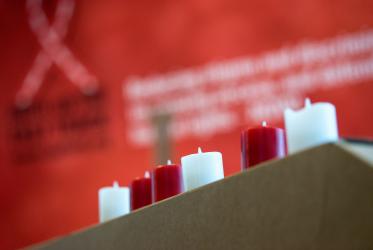Religious leaders are getting tested for HIV in hopes of inspiring others across the world to seek testing, too. Increasing the number of people receiving HIV testing is vitally important in the effort to end AIDS as a public health threat by 2030.
Less than half of people living with HIV know their HIV status, according to UNAIDS. Some don’t know the facts about HIV transmission or treatment; others don’t have access to the test.
But many are afraid of the stigma they may encounter just by getting tested — a stigma the World Council of Churches (WCC) is hoping to lift with the campaign “Leading by Example: Religious Leaders and HIV Testing.” The campaign will begin on 1 Dec. - World AIDS Day - with a morning prayer service at the Ecumenical Centre in Geneva, Switzerland.
“To end HIV and AIDS, we have to overcome the stigma of HIV testing,” said Francesca Merico, HIV campaign coordinator for the WCC-EAA. “By getting tested for HIV, you aren’t making a statement about morality — you’re taking care of your health.”
As of June 2016, 18.2 million people — less than half of people living with HIV — were receiving treatment, according to UNAIDS.
At the Ecumenical Centre, WCC invites the community to visit an exhibit of banners depicting religious leaders who are promoting HIV testing by getting tested themselves. The World Health Organization will offer a demonstration of an HIV self-test, and self-test kits will be available for free.
“Come worship, come visit the exhibit and, most important, make a commitment to get tested,” said Merico. “Together, we will lift the stigma in a spirit of unity, acceptance and caring - for ourselves and for each other.”
“When I go to see my doctor I get tested for high blood pressure, diabetes, and many other things. So why should I not be tested for HIV?” says Rev. Dr Nyambura Njoroge, coordinator of the WCC Ecumenical HIV and AIDS Initiatives and Advocacy. “Faith leaders have a lot of influence in the community. We are leaders. I am hoping that many religious leaders will go for testing, and that people in the congregations will also follow,” she adds.
Ideas for churches
Worldwide, churches, communities, families, and individuals can join the effort by accessing an online order of service and by making a commitment to get tested.
Materials from the WCC-EAA are designed for religious leaders and others to use in sermons or in other forums to share accurate information about HIV testing.
“Set aside an HIV testing Sunday each month, or an HIV testing week or month each year,” suggested Merico. “Share your efforts with the media. Tweet about the importance of HIV testing using #KnowYourStatus. Instagram your faith leader supporting HIV testing.”
Speakers at the campaign launch will include:
- Pradeep Kakkattil, director, UNAIDS Executive office
- Dr Rachel Baggaley, coordinator, HIV Prevention and Testing, World Health Organization
- Stanley Noffsinger, director, Office of the General Secretariat, World Council of Churches
- Dr Mwai Makoka, programme executive, Health and Healing, World Council of Churches
- Francesca Merico, HIV campaign coordinator, World Council of Churches Ecumenical Advocacy Alliance
Speakers will be available for questions from the press directly after the launch.
World AIDS Day Service and HIV Testing Campaign Launch
Religious leaders and HIV testing
Video: WCC general secretary explains why he got tested for HIV









